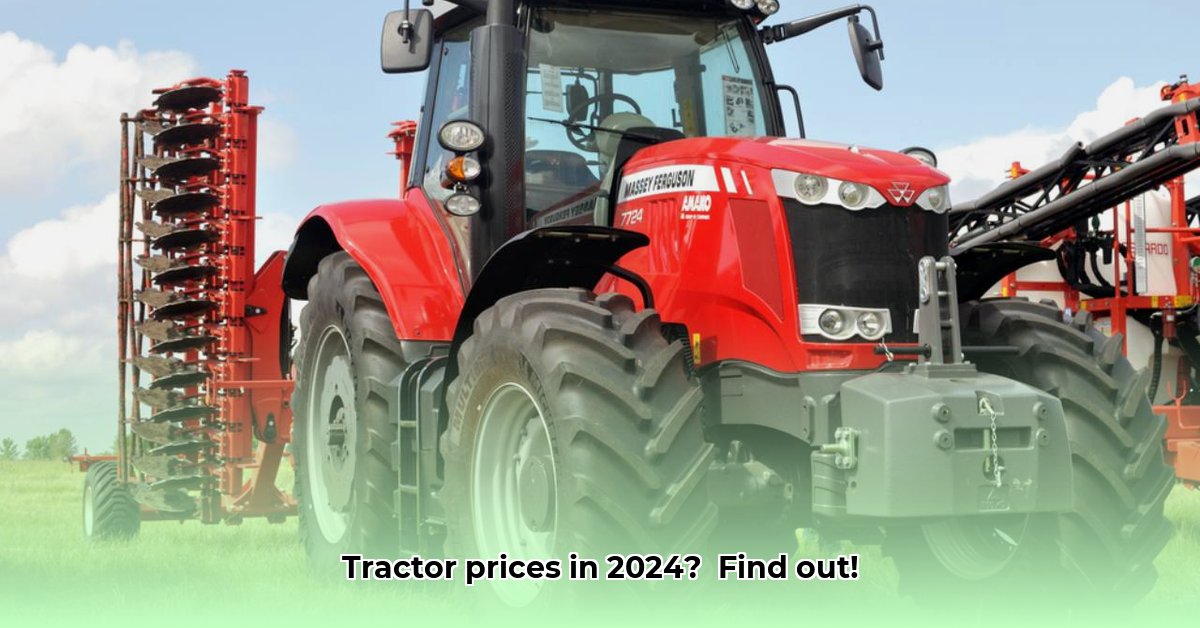
Thinking about buying a tractor? This comprehensive guide will help you navigate the complexities of tractor pricing, financing, and maintenance to make a smart, informed decision. The cost of a tractor varies dramatically depending on several key factors, so let's break it down. For more on specialized pulling tractors, check out this helpful resource: Pulling Tractor Costs.
Tractor Power and Size: A Major Price Driver
The most significant factor influencing tractor cost is horsepower (HP) and overall size. Think of HP as the tractor's "muscle"—more HP means more power and capability, but also a higher price tag. This mirrors the car market: a compact car costs less than a heavy-duty truck.
- Small Tractors (under 30 HP): Expect to pay between $9,000 and $12,000. These are suitable for smaller properties and light-duty tasks.
- Mid-Sized Tractors (30-80 HP): These range from $22,700 to $50,000 or more, offering increased versatility for a wider range of farming tasks.
- Large Tractors (100+ HP): Prices here start at $50,000 and can easily exceed $80,000, sometimes reaching well over $600,000 for high-end, specialized models.
Do you need a rhetorical question to guide your decision-making? What tasks will your tractor primarily perform, and how much horsepower do you truly need?
Attachments and Add-ons: Expanding Your Investment
Remember that the base tractor price is just the beginning. Essential attachments, such as front-end loaders, backhoes, mowers, and plows, add considerable cost. Budget an additional $3,000 to $7,000 or more, depending on the specific implements required for your operations. This is a vital consideration for accurate budgeting. A quantifiable fact: adding a front-end loader can easily increase your total cost by 15-25%.
New vs. Used Tractors: Weighing the Options
The decision between a new or used tractor significantly impacts your initial investment and long-term costs.
New Tractors:
- Pros: Warranty, known maintenance history, latest technology.
- Cons: Higher purchase price, faster depreciation.
Used Tractors:
- Pros: Lower initial investment, potential for significant savings.
- Cons: Hidden mechanical issues, limited to no warranty, uncertain maintenance history. A thorough pre-purchase inspection is crucial.
"Thorough inspections are essential when buying used equipment," says Dr. Emily Carter, Professor of Agricultural Engineering at Purdue University. "A qualified mechanic can identify potential problems that could lead to significant repair costs later."
Financing Your Tractor Purchase: Exploring Options
Financing is almost always necessary when buying a tractor. Explore dealer financing, bank loans, and potentially government programs like USDA loans. Carefully compare interest rates, loan terms, and repayment plans before committing.
Ongoing Costs: Maintenance and Operation
Beyond the purchase price, factor in regular maintenance and repair costs. These expenses can vary greatly depending on usage, tractor type and age. Allocate a yearly budget to cover routine service, parts replacement, and potential unexpected repairs. A realistic annual maintenance budget might range from $500 to well over $2,000. Another critical component often overlooked is fuel cost, which fluctuates constantly.
Step-by-Step Guide to Buying a Tractor
- Define Your Needs: What tasks will the tractor perform? This determines the required HP and size.
- Budget Wisely: Establish a realistic budget encompassing the tractor, attachments, financing, maintenance, and fuel.
- Shop Around: Compare prices from multiple dealers, both for new and used tractors. Always obtain written quotes.
- Explore Financing: Compare various loan options (dealer financing, bank loans, government programs) and their associated costs.
- Include Attachments: Remember to account for the added cost of necessary implements in your budget.
- Plan for Maintenance: Don’t underestimate the importance of allocating funds for long-term maintenance and potential repairs.
Budgeting Your Tractor Investment: A Sample Breakdown
This table provides a general cost estimate. Actual costs vary significantly based on location, tractor type, and condition.
| Expense Category | Estimated Cost Range | Notes |
|---|---|---|
| Tractor Purchase (New) | $9,000 - $600,000+ | Size and features significantly impact price. |
| Tractor Purchase (Used) | Highly Variable | Condition and hours of operation are critical. |
| Attachments | $3,000 - $7,000+ | Costs depend on your needs and choices. |
| Financing Interest | Variable | Interest rates and loan terms influence overall cost. |
| Taxes and Fees | Variable | Check local requirements. |
| Annual Maintenance | $500 - $2,000+ | Varies based on usage, tractor age, and type. |
| Fuel Costs | Variable | Fuel prices fluctuate; plan accordingly. |
Remember to factor in the Total Cost of Ownership (TCO) — a comprehensive approach accounting for all costs over the tractor's lifespan — when comparing new and used options.
How to Compare Used Tractor Prices and Reliability
Buying a used tractor offers potential savings, but requires diligent assessment. A thorough inspection and mechanical assessment are paramount. These are essential steps to avoid costly surprises down the line.
Key Considerations for Used Tractors:
- Thorough Inspection: Check for wear and tear, leaks, corrosion, and other damage.
- Professional Mechanical Assessment: Engage a qualified mechanic to inspect key components.
- Service History Verification: Obtain and review maintenance records. This indicates the tractor's overall health and history.
- Price Comparison: Research comparable models to ensure you're getting a fair price.
Remember, the purchase price is only one element of the total cost. Thorough research, realistic budgeting, and careful consideration of both new and used options will safeguard your investment and ensure you get the best tractor for your needs.